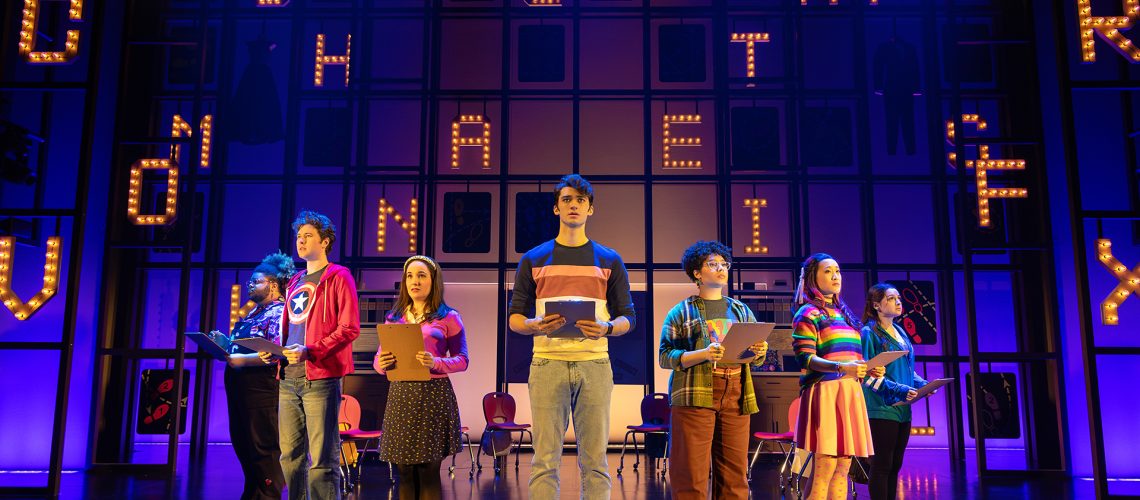Hear what Sammi Cannold, the director of How to Dance in Ohio on Broadway has to say about the show, representation on stage, and more.
Transcript
StageNotes: What’s so interesting to me is, as I’ve done so many of these interviews, a lot of the producers I’ve spoken to are hesitant to cast people living with disabilities, either because they’re afraid that they won’t be able to make accommodations or they’re afraid of not getting it right, not getting it 100% perfect. And so I want you to speak to that, because I know you brought in, um, accessibility coordinators and folks to help you make those accommodations. And so can you speak to that process and. And what kind of accommodations did these performers needed?
Sammi Cannold: Yeah, absolutely. I think, um, in our case, it was about, uh, making sure that everybody. I think it’s exactly you say everybody had what they needed. I think that, you know, we, as a team, felt like it was our responsibility and our job to make sure that both the audition process and the rehearsal process were ready to meet our performers, autistic or otherwise, wherever they, with what they needed.
And I think that in the audition process, a lot of that was just sort of breaking down different parts of how to make it as human as possible.
So, for example, some audition rooms that you walk into, you just automatically are supposed to start doing your material, and there’s not any introduction or conversation or anything of the sort. So what we really wanted was an actor comes in the room and we say, hello, here are the names of everybody at the table. Here’s how this audition process is going to work. We walk them through it.
You know, I think to people who aren’t in the theater, that’s a little bit like, well, duh, why wouldn’t you say hello? You know? And I think to people who are in the theater, sometimes that’s like, oh, my gosh, you know, you have to fit so many people in, in one day. How do you have time to do that in the audition process? And I think it was really just about saying, you know, our priorities are where our priorities are, and so we’re going to prioritize saying hi, and, you know, and then, you know, that’s just one example of, like, many, many, many different things that we did to sort of adjust the process.
And I think that one of my big takeaways is, of course, the impetus for adjusting the process was that we had autistic actors in the room and were going to have autistic audience members as well.
But ultimately, a lot of what we learned from making the process more quote unquote, accessible, um, is that we should really just be doing this always. You know, it’s not, you know, they’re. They’re. It’s really just about asking what people need and then figuring out how to make sure everybody can do their best work. Um, and that’s something that I will carry with me into any other process I do, you know, regardless of sort of who’s in the company, so much.
StageNotes: So much of the focus has been spent on these tremendous actors who are just tremendous actors who happen to have autism. But for me, the piece that really touched me was the story of the families and the arc of the moms. And I felt like it didn’t sugarcoat things.
Can you talk about their arc in the midst of the other storytelling that was is so much at the center of the show?
Sammi Cannold: Yeah, absolutely. I think, to me, those characters in the show, my way into them is thinking about growing up with my brother, who is autistic and so badly wanting to help him and with what he was encountering and also not having any clue how.
And so I think that a lot of what the parents do in the show is sort of highlight a knowledge gap and an unfamiliarity that we as a society have with how to talk about disability, how to raise disabled children, all these things that feel like now we’re in an age where this information is now being shared on TikTok and in Broadway shows and on television and all these things, which is really exciting.
And ten years ago, that really wasn’t the case. I’m excited about where the conversation is going, and it was really wonderful to be able to mold those characters alongside those actors.
StageNotes: I love that. And I love that you said that. Because truth is, when my daughter was growing up, and you mentioned ten years ago, ten years ago, what we all thought was autism or the only reference we had was Rain man. And so I think as my daughter was growing up, one of the things that was really difficult for us, because she is high functioning, was folks would look at us and be like, well, she’s not Rain man. She doesn’t do those things. And it was like, okay, that’s just one side of this spectrum. So I love that there are stories now depicting other sides. So we see that it is a spectrum and not just one character that we’re all referencing. So I think we’re moving ahead a little bit on the representation.
Sammi Cannold: I mean, that was something that’s really important to the writers, that the show intentionally depicts seven different narratives of autistic individuals, not one.
And that’s not to say that all seven of them sort of complete the spectrum. They don’t. But it is to say that there are so many different narratives from autistic individuals, and to just sort of highlight one and say that we’ve covered it would have sort of being complete.
Stagenotes: I feel like there’s been so many conversations and narratives around the show that I’m hoping it changes the industry. Do you think we will not just with this show, but even with performers like Ali Stroker, that we’re going to start seeing a shift on Broadway as to the kinds of stories we’re seeing and the folks who get to tell those stories?
Sammi Cannold: Absolutely. I mean, I think the show’s closing is first and foremost related to the financial state of Broadway right now. To me, what’s happening with these shows, and it’s not just ours, is that the cost of running them and the time it’s taking to build an audience for titles that people may not be that familiar with isn’t aligning, and it’s really unfortunate and it’s really sad.
That said, on the other side of it, I think that to me, the legacy and the purpose and what the show has accomplished stands on its own, regardless of the length of its run. And that’s not my sort of patting myself on the back. It’s about a company of hundreds of people that made this happen, because I think that to me, the victories are a few different things. One, I don’t think you’ll ever be able to have a musical on Broadway that has an autistic character and not cast an autistic actor again, you know, we’ve proven that the talent is out there, and so that that can happen.
Two, I think that, you know, it’s a plan to take these stories and, you know, have the, the platform of Broadway says these stories are important. These stories need to be amplified.
And I hope that it, for folks who might not be that familiar with the subject matter, I hope it encouraged them to go learn more, ask more questions.
And I think it’s a step in a series of many steps. But I think there are many different ways in which the show being on Broadway at all or existing at all is really important. And so I’m excited to see sort of what comes next in terms of where else it could be performed. And I’m really excited to actually see productions one day directed by other people in schools and community theaters and everything. And that will be such a joy for me.
StageNotes: I’m excited to see what happens next. I’m so happy we have a cast album because I think so many of those songs truly can become anthems. I’d be remiss if I didn’t ask you about your camp Broadway experience and how going to Camp Broadway informed your approach to theater or even you wanting to go into theater?
Sammi Cannold: My Camp Broadway experience was a, spectacular and b, so much of the reason I do what I do, I think I went, like seven summers, six summers, maybe. It was so formative. I think, you know, it’s so funny to me that the New York program, at least at the time, and I think maybe it still is, it’s only a week. And yet, like, that week was like the seminal week of my year, you know, it was like I was like, everything built up to that week.
And I think it’s both. You know, what I’m. I was learning as a camper sort of in the studio, the practical skills, the choreography and everything, which obviously, I don’t use as a dancer today, but I used my understanding of them as a director. But it was also the pre professional exposure of meeting people from all corners of the industry, going to the show on the Wednesdays of that week and talking to the cast.
I also, I mean, I remember things like we would meet with, like, makeup designers and, you know, I remember meeting many directors through the program. And I think that it really gave me and I know for several other alums, like, a sense that you don’t have to be an actor to be involved in theater. Like, there’s so much more you can be. But for those of us who do not have the talent, there are other ways to be involved. So I was really excited about that. And, yeah, I loved it a lot.
StageNotes: What I love about this program, why I’m involved in this program, is they wrap their arms around so many children coast to coast. So, what advice would you have for those kids who feel othered or who just don’t fit into the box? What advice would you have for them?
Sammi Cannold: I would say do as much as you can in the theater.
And what I mean by that is try as many different parts of the theater that are exciting to you. I think that once you reach maybe like 13, 14, you know, opportunities start popping up to, you know, be on crew or, you know, help with, like, the advertising of the show in your school or wherever it may be. And I think that, you know, to me, a sort of well-rounded theater education where you understand all the moving parts and not just what it’s like to be an actor, can lead to so many career paths in the theater. Because I think a lot of people don’t. A lot of people when they’re growing up, don’t know that there are all these other people in. I think they know that there are actors. They see the actors on stage, and they know that part, but they don’t really see much beyond that. And I think that for me, Camp Broadway was a huge part of the reason that I understood that there were all these people offstage doing all these different things and that was more where I belonged to. To me, so much of theater is about passion and love.
And so, if you love it, do it.

